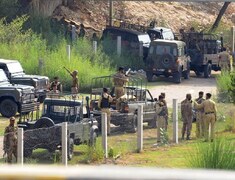Tensions Rise as Pakistan and India Exchange Fire in Kashmir
For the third consecutive night, Pakistani and Indian forces engaged in exchanges of fire in the contested Kashmir region, as confirmed by officials on Sunday. This recent escalation has further strained relations between the two nuclear-armed nations, bringing them to a new low point in recent years.
India has placed blame on Pakistan for allegedly backing “cross-border terrorism” following a deadly attack that resulted in 26 civilian deaths. This assault marked the most severe targeting of civilians in the disputed Muslim-majority Kashmir in the last 25 years.
Islamabad has refuted any involvement, dismissing accusations linking Pakistan to the assault as baseless and promising a response to any action taken by India.
The Indian military conducted naval exercises on Sunday, releasing visuals of warships launching missiles. Simultaneously, security forces continued their pursuit of those responsible for the April 22 attack at a popular tourist destination in Pahalgam.
The military attributed the exchange of small arms fire along Kashmir’s Line of Control (LoC) to “unprovoked” actions by Pakistan. The LoC serves as the boundary separating the two countries in the region.
“(Our) own troops responded effectively with appropriate small arms fire,” the military stated regarding the recent incident, which has not been acknowledged by Pakistan. Indian authorities have released wanted notices for three individuals—two Pakistani nationals and one Indian—identified as members of Lashkar-e-Taiba, a UN-designated terrorist organization.
India’s federal home ministry has entrusted the investigation of the attack to the National Investigation Agency, specializing in counter-terrorism operations.
“The eyewitnesses are being questioned in minute detail to piece together the sequence of events that led to one of the worst terror attacks in Kashmir,” the agency conveyed in a statement on Sunday.
Pakistan’s Prime Minister Shehbaz Sharif stated on Saturday that his country is “open to participating in any neutral, transparent and credible investigation” into the incident.
India’s navy indicated that it conducted drills to “revalidate and demonstrate readiness of platforms, systems and crew for long range precision offensive strike”, without providing specifics on the location of these exercises.
A high-ranking government official, in conversation with The Indian Express newspaper on Sunday, suggested that “there will be military retaliation” and that officials “are discussing the nature of the strike”.
Kashmir has remained a divided territory between India and Pakistan since their independence in 1947. Each country asserts complete claim over the region, but they administer separate sections.
Since 1989, insurgent groups have been engaged in activities in Indian-administered Kashmir, pushing for either independence or integration with Pakistan.
India’s Prime Minister Narendra Modi affirmed on Sunday that the victims in Pahalgam “will get justice”.
“Terrorists and their patrons want Kashmir to be destroyed again, that is why such a big conspiracy was hatched,” he remarked during his monthly radio address.
On Saturday, in Indian-controlled Kashmir, the family residence of one of the suspected individuals involved in the Pahalgam attack was bombed by soldiers.
The home belonging to Farooq Ahmad Tadwa was demolished by authorities in the Kupwara district, as part of a series of demolitions targeting the homes of suspected militants.
Since the Pahalgam attack, nine houses of alleged militants have been bombed, according to a police official on Sunday who requested anonymity.
Following the attack, New Delhi chose to suspend a water-sharing agreement, declared the closure of the main land border crossing with Pakistan, reduced diplomatic relations, and revoked visas for Pakistani citizens.
In response, Islamabad has directed the expulsion of Indian diplomats and military personnel, rescinded visas for Indian nationals (excluding Sikh pilgrims), and closed the primary border crossing from its side.
The United Nations has called upon both nations to exercise “maximum restraint” to enable the resolution of issues “peacefully through meaningful mutual engagement”.
The Pahalgam incident marks a notable change in recent Kashmiri rebel attacks, which have typically targeted Indian security forces.
In 2019, a suicide attack resulted in the deaths of 41 Indian soldiers in Kashmir, leading to Indian airstrikes within Pakistan and pushing the two countries to the brink of full-scale conflict.



Comments (0)
No comments yet. Be the first to comment!
Leave a Comment